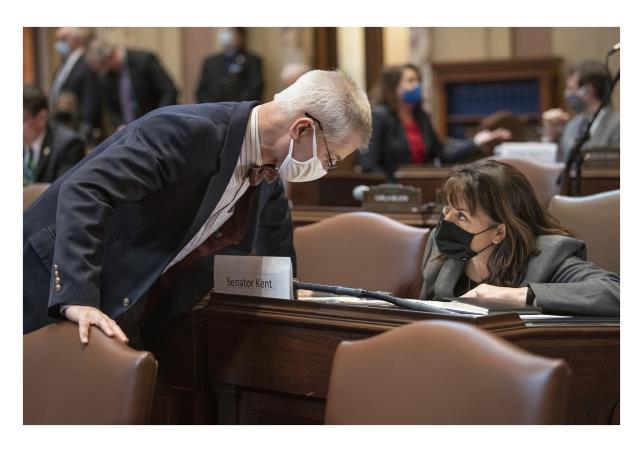|
Dear Friends and Neighbors,
Now that the 2021 legislative session and the special session have ended and the legislature has adopted a new budget, I want to share my perspectives on the session, and invite you to attend our District 66 Town Hall meeting on July 26th.
With help from the federal government and its COVID relief packages, the state budget will provide significant help to Minnesota families and businesses hurt by COVID. However, the pandemic exposed many weaknesses in the economy and aggravated serious inequities.
We already had a housing crisis prior to COVID, but the pandemic made it worse, and more visible. The same is true with our healthcare crisis.
Fortunately, as vaccinations have helped reduce the spread of COVID, and as schools, businesses, and households return to more normal patterns, our economy continues to pick up. The state budget has numerous expenditures that will help Minnesotans and I am pleased that the budget has been adopted, albeit on the last possible day before a state shutdown.
Unfortunately, both the legislative process and the outcome left much to be desired. The lack of transparency around the creation and negotiation of budget legislation continues to get worse, along with the lack of engagement of minority party legislators. This not the way our government should operate, nor does it produce the results that Minnesotans deserve. I will continue pushing to reform the political process and to work for a healthy environment and economy for all Minnesotans.
Although you may have heard about many legislative actions in the news, I highlight a number of issues and concerns below that you might not have heard about. This year’s end of session report will be in three parts, in order to devote space to a variety of important issues from this session. Below is part one of the session report.
Rep. Alice Hausman and Rep. Athena Hollins are joining me in hosting a virtual town meeting on July 26th from 5:30-7pm. We hope that you can join us to discuss the recent legislative session. Click here for the Facebook event: https://bit.ly/District66Mtg or RSVP here to get the Zoom link: https://bit.ly/District66RSVP
Thank you for giving me the honor to serve as your Senator.
Warm regards,

John Marty

Governor Walz’s Emergency Executive Orders During Pandemic
At the beginning of the pandemic the President and the Governors of all fifty states used emergency executive orders to address the rapidly spreading COVID crisis. Governor Walz used that authority – which is given to him under Minnesota law – to help hospitals and medical providers get the personal protective equipment needed, to quarantine people at home, to temporarily exempt businesses, government, non-profits, and individuals from requirements (such as the need to renew licenses) that would be impossible to comply with during the pandemic, and requiring non-essential businesses to temporarily close or restrict hours and customers, and ordering people to stay at home except for essential activities.
Over the past year and a half, there have been repeated attacks on Governor Walz for using those powers to reduce the transmission of COVID in Minnesota. Walz’s steady, analytical decision-making followed the rapidly growing understanding scientists had of COVID, and produced life-saving results. Minnesota had fewer deaths per capita than any of our surrounding states despite that fact that Minnesota has a metro area far more than twice as large of any other metro area in those states (large metro areas, with higher population density, lead to greater risk of transmission).
Most of the attacks on Governor Walz were harsh and politically motivated. He was accused of being a “dictator,” despite the reality that all 50 governors had declared emergencies and were using executive orders, and despite his outreach to the legislature to work with him on addressing these issues.
I have concerns about the potential over-use of executive orders and would have been willing to limit them if the legislature would step in with an alternative. However, when my Republican colleagues repeatedly voted to end the governor’s emergency authority before the COVID pandemic was over, not only were they unwilling to take legislative action – to address social distancing, or set guidelines for school openings and closings, or provide an off-ramp to avoid massive homelessness as the eviction moratorium ended – they refused even to hold hearings to discuss those issues!
Last summer, before the Governor established a mask mandate, I had proposed legislation on the issue, believing it appropriate for the legislature to debate the issue and figure out what the most beneficial requirements might be. However, the Senate majority did not give the bill a hearing and refused to consider the issue. The Senate Republicans preferred to have the Governor address it, giving them a chance to criticize him for “unilaterally” imposing the restrictions.
After the 9/11/01 attacks on the World Trade Center, Americans pulled together in a united effort to respond and to help each other. Unfortunately, when the nation faced the COVID crisis, some politicians and pundits used the crisis to divide the public. Wearing masks, keeping social distancing, and getting vaccinations, should never be politicized – they are actions, often involving sacrifices that we should be willing to take, to protect one another.
Although each of us may have made different decisions than Governor Walz made if we were in his shoes, I appreciate the thoughtful approach Walz took, in what was clearly a “no-win” situation. I am pleased that the final budget negotiations produced an off-ramp to end the emergency this summer and help the state move forward, as we deal with the ongoing risks from the pandemic.

Policing and Public Safety
Once again, Republicans blocked progress on meaningful changes to our system of public safety. The House held multiple hearings on police reform and accountability all session. The Senate Republicans refused to schedule any hearings on the issue. When the House proposals were discussed in conference committee, Senate Republicans said that the provisions needed further study (which would have occurred if they had been willing to hold hearings). The final negotiations led to a bill that contained only a few minor provisions to help prevent future harm to communities of color at the hands of police.
I am grateful for the many people who advocated for these important provisions, but am outraged that once again, the substantial changes we need were rejected by the Senate majority. After the murder of George Floyd, the eyes of the nation were on Minnesota, and we failed to live up to this opportunity to make real change to ensure everyone in our state is safe.
COVID Relief and Taxes
The original Senate Republican tax bill spent $660 million on business tax relief but only $54 million on working Minnesotans. It also included harmful private-school voucher language. Fortunately, the final bill passed this year after negotiations with the DFL House and Governor yielded a law that provides significant help for Minnesotans who economically struggling due to the pandemic, and also includes $24 million for targeted community grants, $30 million in affordable housing and homelessness prevention efforts, and $250 million in supplemental payments to frontline workers.
For Minnesotans who experienced unemployment in 2020, this bill allows them to subtract up to $10,200 of unemployment compensation received in Tax Year 2020, matching the federal government’s treatment of these benefits. Unfortunately, the Senate’s reluctance to allow tax relief for people who had received unemployment compensation initially prevented this bill from passing before taxes were due. However, I am pleased that the Department of Revenue may be able to adjust many returns and issue refunds without requiring amended returns. Please visit this website for the most up to date information from the Department of Revenue.
I remain concerned that our tax code is unfair and adds to the growing economic disparities in which some people have unimaginable wealth while many are unable to pay for food and other basic needs. I supported Governor Walz’s proposed tax increases on wealthy people and businesses, and will continue to push for a fair, progressive tax system so that all people can thrive.
Eviction Moratorium Off Ramp and Rent Help
After much debate, both the House and Senate eventually agreed to a process to end the eviction moratorium, with time built in to allow people to get help with housing costs to prevent evictions. This agreement will assist be helpful to both landlords and tenants. It will prevent evictions for nonpayment of rent until June 2022 if renters are applying for rent assistance. At the same time, it allows evictions for material breaches of leases other than non-payment. Landlords will be required to provide 15 days of notice before filing an eviction and details on applying for assistance. Please visit RentHelpMN.org to get information on rent assistance.

Essential Workers
Throughout the pandemic, I have supported proposals to provide paid emergency leave and back pay to essential workers who put their lives on the line and helped us through the COVID crisis.
The final tax bill included $250 million in federal funds to certain frontline workers. The legislation requires that some payments go to long-term care employees and creates a working group to consider other workers who had increased financial burdens and high risk of virus exposure. The legislature will likely come back into special session in September to pass legislation distributing these funds.
The past 18 months have exposed so many unmet needs in our society and made those problems even worse. The lack of support and inadequate pay that so many workers face is one of the most serious of those problems. In a fair and just society, wages and benefits would be sufficient so that every worker is able to provide food, shelter, and other basic needs for their families. I will continue pushing for increased wages and sick and family leave for all workers, but I appreciate that this funding will provide at least some help for those who have risked so much during the pandemic.
The second and third parts of this legislative report will be forthcoming in the following weeks.
Contact Information
We hope you can join our virtual town hall on July 26 to discuss these and other issues. The meeting will be recorded and available on Facebook for later viewing. If you wish to get in touch with me please call my office at 651-296-5645 or reach out to my legislative assistant, Elspeth Cavert, at elspeth.cavert@senate.mn. |